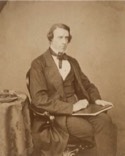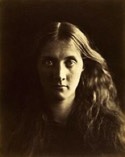Clement-Jones family - Person Sheet
Clement-Jones family - Person Sheet
Birth1832
Death1904
FatherSir James STEPHEN KCB , 7848 (1789-1859)
MotherJane Catherine VENN , 7851 (1793-1875)
Spouses
1Julia Prinsep JACKSON  , 7833
, 7833
 , 7833
, 7833Birth1846
Death1895
FatherDr John JACKSON , 7831 (1804-1887)
MotherMaria PATTLE , 7832 (1818-1892)
Children(Adeline) Virginia , 7835 (1882-1941)
Vanessa , 7836 (1879-1961)
Adrian Leslie , 7839 (1883-1948)
Thoby , 7840 (1880-1906)
Birth1840
Death1875
FatherWilliam Makepeace THACKERAY , 9107 (1811-1863)
MotherIsabella Gethen Creagh SHAWE , 9146 (1816-1893)
ChildrenLaura Makepeace , 9105 (1870-1945)
Notes for Sir Leslie STEPHEN KCB
A notable historian, author, critic and mountaineer.
Sir Leslie Stephen, KCB (28 November 1832 – 22 February 1904) was an English author, critic and mountaineer, and the father of Virginia Woolf and Vanessa Bell.
Life
Stephen was born at Kensington Gore in London, the brother of James Fitzjames Stephen and son of Sir James Stephen. His family had belonged to the Clapham Sect, the early 19th century group of mainly evangelical Christian social reformers. At his father's house he saw a good deal of the Macaulays, James Spedding, Sir Henry Taylor and Nassau Senior. After studying at Eton College, King's College London and Trinity Hall, Cambridge, where he graduated B.A. (20th wrangler) in 1854 and M.A. in 1857, Stephen remained for several years a fellow and tutor of his college.[1] He recounted some of his experiences in a chapter in his Life of Fawcett as well as in some less formal Sketches from Cambridge: By a Don (1865). These sketches were reprinted from the Pall Mall Gazette, to the proprietor of which, George Smith, he had been introduced by his brother. It was at Smith's house at Hampstead that Stephen met his first wife, Harriet Marian (1840–1875), daughter of William Makepeace Thackeray, with whom he had a daughter, Laura Makepeace Stephen (1870–1945); after her death he married Julia Prinsep Jackson (1846–1895), widow of Herbert Duckworth. With her he had four children:
Vanessa (1879–1961) married Clive Bell
Thoby (1880–1906)
Virginia (1882–1941) married Leonard Woolf
Adrian (1883–1948)
In the 1850s, Stephen and his brother James Fitzjames Stephen were invited by Frederick Denison Maurice to lecture at The Working Men's College. Leslie Stephen became a member of the College's governing College Corporation.[2] He died in Kensington.
[edit]Literary career
While at Cambridge, Stephen became an Anglican clergyman. In 1865, having renounced his religious beliefs, and after a visit to the United States two years earlier, where he had formed lasting friendships with Oliver Wendell Holmes, Jr., James Russell Lowell and Charles Eliot Norton, he settled in London and became a journalist, eventually editing the Cornhill Magazine in 1871 where R.L. Stevenson, Thomas Hardy, W.E. Norris, Henry James and James Payn figured among his contributors.
In his spare time, he participated in athletics and mountaineering. He also contributed to the Saturday Review, Fraser, Macmillan, the Fortnightly and other periodicals. He was already known as a climber, as a contributor to Peaks, Passes and Glaciers (1862), and as one of the earliest presidents of the Alpine Club, when in 1871, in commemoration of his own first ascents in the Alps, he published The Playground of Europe, which immediately became a mountaineering classic, drawing – together with Whymper's Scrambles Amongst the Alps – successive generations of its readers to the Alps.
During the eleven years of his editorship, in addition to three volumes of critical studies, he made two valuable contributions to philosophical history and theory. The first was The History of English Thought in the Eighteenth Century (1876 and 1881). This work was generally recognized as an important addition to philosophical literature and led immediately to Stephen's election at the Athenaeum Club in 1877. The second was The Science of Ethics (1882). It was extensively adopted as a textbook on the subject and made him the best-known proponent of evolutionary ethics in late nineteenth-century Britain.
Stephen also served as the first editor (1885–91) of the Dictionary of National Biography.
Sir Leslie Stephen, KCB (28 November 1832 – 22 February 1904) was an English author, critic and mountaineer, and the father of Virginia Woolf and Vanessa Bell.
Life
Stephen was born at Kensington Gore in London, the brother of James Fitzjames Stephen and son of Sir James Stephen. His family had belonged to the Clapham Sect, the early 19th century group of mainly evangelical Christian social reformers. At his father's house he saw a good deal of the Macaulays, James Spedding, Sir Henry Taylor and Nassau Senior. After studying at Eton College, King's College London and Trinity Hall, Cambridge, where he graduated B.A. (20th wrangler) in 1854 and M.A. in 1857, Stephen remained for several years a fellow and tutor of his college.[1] He recounted some of his experiences in a chapter in his Life of Fawcett as well as in some less formal Sketches from Cambridge: By a Don (1865). These sketches were reprinted from the Pall Mall Gazette, to the proprietor of which, George Smith, he had been introduced by his brother. It was at Smith's house at Hampstead that Stephen met his first wife, Harriet Marian (1840–1875), daughter of William Makepeace Thackeray, with whom he had a daughter, Laura Makepeace Stephen (1870–1945); after her death he married Julia Prinsep Jackson (1846–1895), widow of Herbert Duckworth. With her he had four children:
Vanessa (1879–1961) married Clive Bell
Thoby (1880–1906)
Virginia (1882–1941) married Leonard Woolf
Adrian (1883–1948)
In the 1850s, Stephen and his brother James Fitzjames Stephen were invited by Frederick Denison Maurice to lecture at The Working Men's College. Leslie Stephen became a member of the College's governing College Corporation.[2] He died in Kensington.
[edit]Literary career
While at Cambridge, Stephen became an Anglican clergyman. In 1865, having renounced his religious beliefs, and after a visit to the United States two years earlier, where he had formed lasting friendships with Oliver Wendell Holmes, Jr., James Russell Lowell and Charles Eliot Norton, he settled in London and became a journalist, eventually editing the Cornhill Magazine in 1871 where R.L. Stevenson, Thomas Hardy, W.E. Norris, Henry James and James Payn figured among his contributors.
In his spare time, he participated in athletics and mountaineering. He also contributed to the Saturday Review, Fraser, Macmillan, the Fortnightly and other periodicals. He was already known as a climber, as a contributor to Peaks, Passes and Glaciers (1862), and as one of the earliest presidents of the Alpine Club, when in 1871, in commemoration of his own first ascents in the Alps, he published The Playground of Europe, which immediately became a mountaineering classic, drawing – together with Whymper's Scrambles Amongst the Alps – successive generations of its readers to the Alps.
During the eleven years of his editorship, in addition to three volumes of critical studies, he made two valuable contributions to philosophical history and theory. The first was The History of English Thought in the Eighteenth Century (1876 and 1881). This work was generally recognized as an important addition to philosophical literature and led immediately to Stephen's election at the Athenaeum Club in 1877. The second was The Science of Ethics (1882). It was extensively adopted as a textbook on the subject and made him the best-known proponent of evolutionary ethics in late nineteenth-century Britain.
Stephen also served as the first editor (1885–91) of the Dictionary of National Biography.


